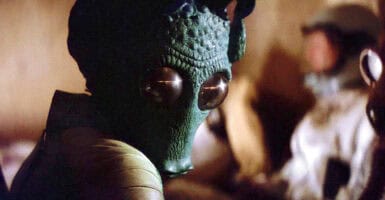Christopher Nolan In Talks For Sci-Fi Flick Interstellar
This article is more than 2 years old

Christopher Nolan has spent nearly a decade crafting his Dark Knight trilogy, saving the big-screen franchise from the chasm of puns and rubber nipples into which Joel Schumacher had driven it with Batman & Robin. But as much as I enjoyed Nolan’s Batman movies, I’ve loved the projects he’s done in between them even more. The Prestige and Inception are easily two of the most memorable genre flicks of the past decade. Now that Nolan has wrapped up his engagement in Gotham, he’s looking for his next project, and now it looks like that project will be a science fiction movie entitled Interstellar.
The Hollywood Reporter reveals that Nolan is in talks to direct and produce Interstellar for Paramount and Warner Bros. It’ll also be a family affair, because the script was written by his brother, Jonathan, who he’s collaborated with on The Prestige, the last two Batman movies, and CBS’ Person of Interest. He also wrote the short story on which Memento was based.
According to THR, “The story involves time travel and alternate dimensions and sees a group of explorers travel through a wormhole.” Shades of Farscape, so that sounds like a good time to me. Bonus points if he casts Ben Browder and fills the movie with Muppets.
Steven Spielberg was going to direct Interstellar at one point, but there’s no word if he’s moved on from the project entirely or if he might still serve as a producer. Given that Spielberg’s plate is so full that he’s postponing certain projects indefinitely, it’s probably a good thing for Interstellar to pass on to another director, especially since the Nolan siblings have a history of making awesome movies together.
One other intriguing note: the script is said to be based on the work of Caltech theoretical physicist Kip Thorne. A quick scan of Thorne’s Wikipedia write-up reveals a section on wormholes and time travel which may or may not provide hints at Interstellar’s story. You may need a degree in astrophysics to follow it all, but here we go:
Thorne was one of the first people to conduct scientific research on whether the laws of physics permit space and time to be multiply connected (can there exist classical, traversable wormholes and “time machines”?). With Sung-Won Kim, Thorne identified a universal physical mechanism (the explosive growth of vacuum polarization of quantum fields), that may always prevent spacetime from developing closed timelike curves (i.e., prevent “backward time travel”). With Mike Morris and Ulvi Yurtsever he showed that traversable Lorentzian wormholes can exist in the structure of spacetime only if they are threaded by quantum fields in quantum states that violate the averaged null energy condition (i.e. have negative renormalized energy spread over a sufficiently large region). This has triggered research to explore the ability of quantum fields to possess such extended negative energy. Recent calculations by Thorne indicate that simple masses passing through traversable wormholes could never engender paradoxes — there are no initial conditions that lead to paradox once time travel is introduced. If his results can be generalised, they would suggest that none of the supposed paradoxes formulated in time travel stories can actually be formulated at a precise physical level: that is, that any situation in a time travel story turns out to permit many consistent solutions.












